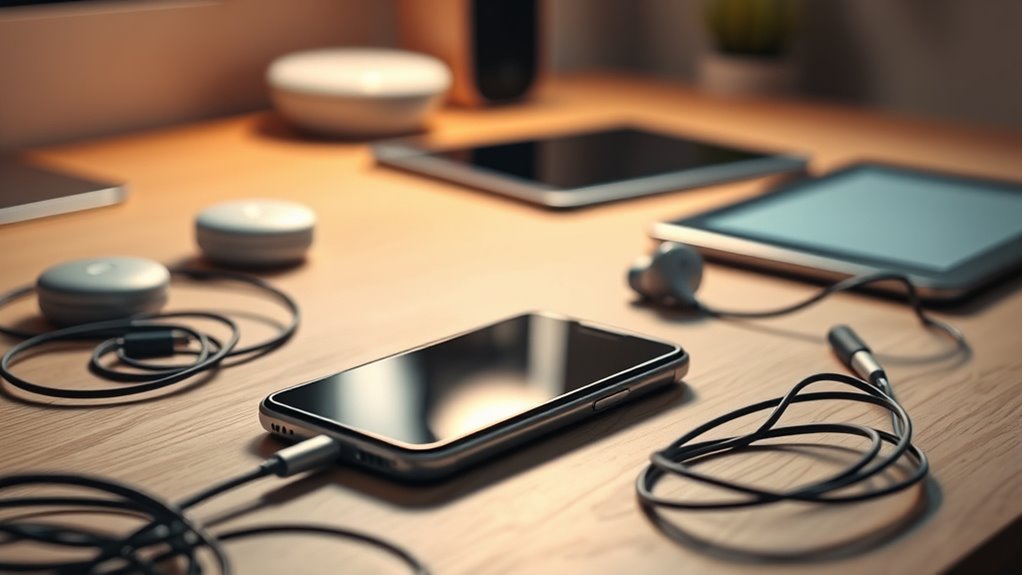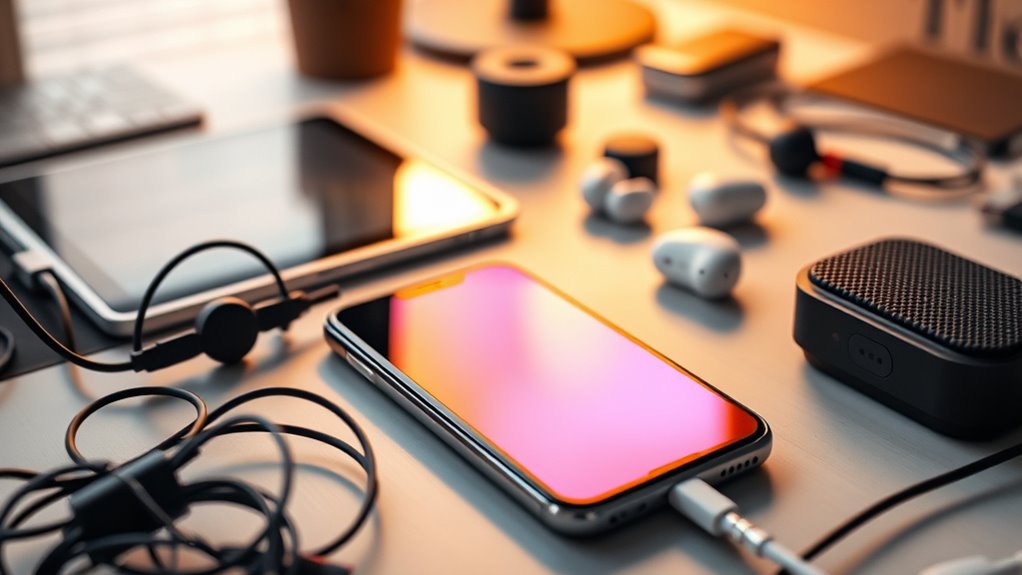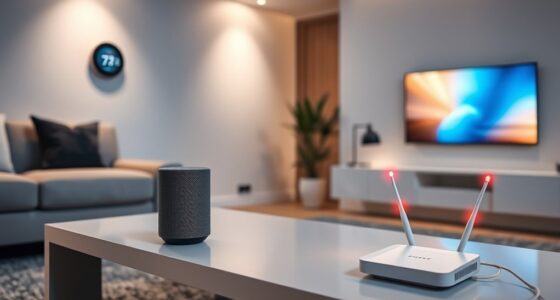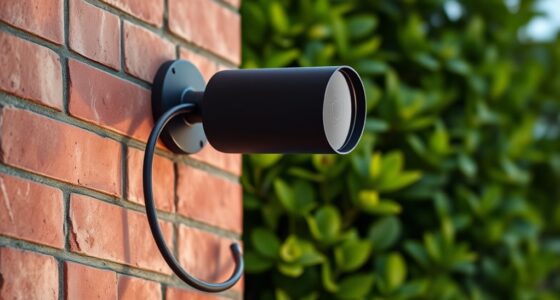Using your smartphone as a hub offers convenience and reduces clutter since you only need one device to control everything. However, it also raises security risks, as vulnerabilities in your phone could compromise your entire system. Compatibility issues and slower performance might occur if your phone isn’t designed to handle multiple protocols. While it’s simpler to set up, ongoing maintenance and security practices are essential. Keep exploring to discover how these factors truly impact your smart home’s reliability and safety.
Key Takeaways
- Using a smartphone reduces hardware costs and simplifies setup but may compromise connectivity and device compatibility.
- Relying solely on a phone can introduce security vulnerabilities, increasing risks of hacking or system disruption.
- Dedicated hubs support multiple protocols and offer faster, more reliable control for complex smart home ecosystems.
- Managing multiple apps on a smartphone can become cumbersome as the smart system expands, impacting user experience.
- The decision depends on balancing convenience and cost savings against potential security risks and system reliability.

In today’s connected world, your smartphone has become more than just a communication device; it’s the central hub for managing your digital life. You rely on it to control smart home devices, stream media, handle payments, and coordinate your schedule. But as you increasingly depend on your phone for these tasks, it’s worth considering the advantages and drawbacks of ditching dedicated hubs in favor of your smartphone alone. One concern that often arises is security risks. When you use your phone as a hub, every connected device becomes a potential entry point for hackers if your phone’s security isn’t tight enough. Unlike dedicated hubs, which typically have built-in security measures and separate firmware updates, your smartphone may not be optimized for managing multiple device connections securely. This can leave your entire smart ecosystem vulnerable if your phone is compromised. Additionally, device compatibility poses another challenge. While many smart devices now support smartphone control via apps or Bluetooth, not all products are fully compatible with your phone’s operating system or hardware. This can lead to connectivity issues, limited functionality, or the need for additional adapters or software workarounds. As your digital ecosystem grows, managing device compatibility becomes more complex, especially if you switch between Android and iOS or introduce new brands that don’t play well together. You might find yourself juggling multiple apps or troubleshooting connectivity problems instead of enjoying seamless integration. Moreover, relying solely on your smartphone means you lose the dedicated hardware features that some hubs provide, such as dedicated buttons, enhanced range, or specialized protocols designed specifically for smart home integration. These dedicated hubs often support multiple protocols like Zigbee or Z-Wave, which your phone may not handle well, resulting in slower response times or unreliable connections. On the upside, ditching a dedicated hub simplifies your setup and reduces clutter, making your environment more streamlined and portable. You also save money since you won’t need to purchase or maintain a separate device. However, this convenience comes with the trade-off of potentially increased security vulnerabilities and device compatibility headaches. If your phone becomes compromised or malfunctions, your entire smart setup could be affected, disrupting your routines. Furthermore, understanding and implementing proper security practices can help mitigate some of these risks. Ultimately, whether you should rely solely on your smartphone as your hub depends on your tech savvy, security practices, and how extensive your smart device ecosystem is. Weighing these factors carefully will help you decide if your phone alone can handle your connected life or if a dedicated hub remains a wise investment.
Frequently Asked Questions
How Does Smartphone Connectivity Compare to Traditional Hubs’ Speed?
When comparing smartphone connectivity to traditional hubs’ speed, you’ll notice that smartphones often face issues like wireless interference, which can slow down your connection. Signal stability tends to be less reliable, especially with multiple devices or in crowded areas. Traditional hubs usually offer more consistent speeds and fewer interruptions, making them better for steady, high-speed connections. So, your experience depends on your environment and your need for reliable, fast data transfer.
Can Smartphones Handle Multiple Device Connections Simultaneously?
Did you know most smartphones can connect to up to 10 devices via Bluetooth or Wi-Fi? While they handle multiple connections, wireless limitations mean performance can suffer if too many devices are active. You might notice slower speeds or lag. Smartphones also prioritize certain devices over others, so if you connect several at once, some may experience reduced functionality. It’s possible but not ideal for heavy, simultaneous device use.
What Are the Security Risks of Using Smartphones as Hubs?
Using your smartphone as a hub poses security risks like data privacy breaches and malware vulnerabilities. When you connect multiple devices, sensitive data may be exposed if your phone isn’t properly secured. Malware can also exploit your phone’s connection to infect linked devices. To protect yourself, keep your software updated, use strong passwords, and enable security features. Stay vigilant to prevent potential security threats from compromising your data and devices.
How Does Battery Life Impact Smartphone as a Hub?
Think of your smartphone’s battery life as a fragile flame that keeps your digital world alive. When you use it as a hub, heavy battery drain becomes a real concern. Poor power management accelerates this drain, leaving you disconnected when you need your device most. To avoid this, optimize your settings and limit unnecessary background activity, ensuring your smartphone can serve as a reliable hub without burning out too quickly.
Are There Specific Smartphones Best Suited for Hub Functionality?
If you’re looking for smartphones best suited for hub functionality, focus on device compatibility and regular firmware updates. These guarantee your phone smoothly connects with various smart devices and stays secure. Look for models with robust connectivity options like Bluetooth and Wi-Fi, and manufacturer support that provides timely updates. This way, your device remains reliable, efficient, and capable of managing multiple smart home gadgets seamlessly.
Conclusion
Switching to your smartphone as a hub might seem convenient, but it’s not without risks. While it simplifies your setup, it’s easy to underestimate how much you rely on dedicated hubs for stability and speed. Maybe it’s just a theory, but trusting your phone alone could leave you vulnerable to glitches and connectivity issues. Sometimes, sticking with a dedicated hub isn’t just about convenience—it’s about ensuring your tech stays reliable when you need it most.









